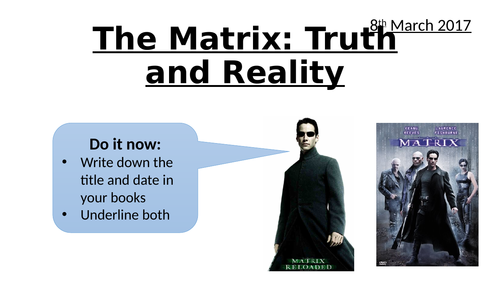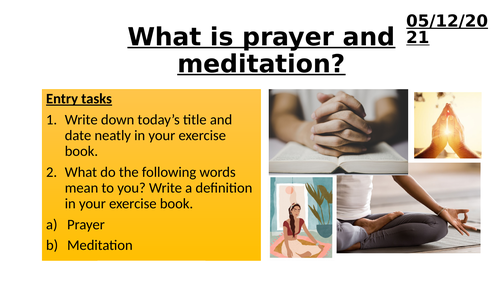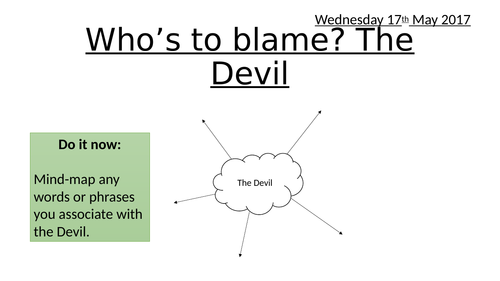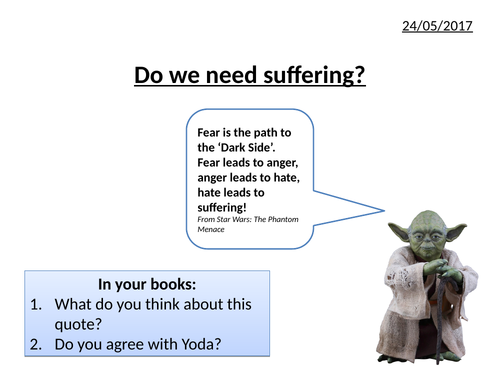338Uploads
118k+Views
41k+Downloads
Philosophy and ethics

Islamophobia
This lesson looks at the issue of Islamophobia. This lesson helps students explore, confront and deconstruct stereotypes targeted at Muslims. Students will learn about the impact of Islamophobia - looking specifically at the media portrayal of Muslims, the Mosque attack in Sweden and Islamophobia Awareness Month.
This lesson has been used as part of an Islam Scheme of Work within Religious Studies, however this can be used before teaching Terrorism within history, or as part of PSHE.
No resources needed - ready to download and teach straight away!
Feedback is welcome, please check out my other lessons on my TES shop.

Features of a Mosque | Islam
KS3 Religious Studies - Lesson 2 of the Islam scheme of work
This lesson looks at an ‘What are the key features of a Mosque?’.
This lesson looks at the key features of mosques - students will complete a worksheet investigating each part of a mosque using information provided on the PowerPoint, complete with a variety of photographs and videos. At the start of the lesson, I encourage students to take off their shoes, wash and cover their heads so they get a full feel for what it is like to enter a mosque. Finally, students will decide what is the most important feature of a mosque and why?
All worksheets and resources needed are included – ready to download and teach!
Feedback is welcome, please check out the rest of my lessons in the Islam scheme of work.

Genocide in the 20th Century
Suitable for teaching KS3 - ideally Y9 due to the content of the lesson;
"Does genocide exist today?"
Students will look at examples of genocide in the 20th century;
Holodomor, Ukraine
Cambodia
Bosnia and Herzegovina
Rwanda
Armenia
Using information sheets (provided) students will complete a table (differentiated) on the different genocides. Students will then be asked to reflect on what they have learnt;
Who is responsible for genocide?
Are other people responsible if they do not try to stop the genocide?
Why do people treat other human beings in ways like these?
What would you do if you were in a situation where a group was being targeted?
What can we do to stop genocide from happening in the future?
This can open up some fantastic and thoughtful discussions.
I use this lesson after teaching the Holocaust, as often I find other genocides tend to be forgotten about in the curriculum.
All resources needed are included - please consider teaching this important lesson! Feedback is welcome.

Respecting the Qur'an | Islam
KS3 Religious Studies - Lesson 5 of the Islam scheme of work
This lesson looks at 'How do Muslims respect the Qur’an?'
This lesson looks at:
Origins of the Qur’an
Contents of the Qur’an
Memorising the Qur’an
Respecting the Qur’an
This lesson focusses on how and why Muslims respect the Qur’an. There is also an interesting look at the Qur’an in the news where libraries did not store the Qur’an on the top shelf - and why it is important that everyone respects the holy books of others. The lesson finishes with a key word glossary task.
All worksheets and resources needed are included – ready to download and teach!
Feedback is welcome, please check out the rest of my lessons in the Islam scheme of work.

What are Ultimate Questions?
KS3 Philosophy and Ethics - Lesson 1 of the ‘What Big Questions are there?’ Scheme of Work.
This lesson looks at ‘What are Ultimate Questions’?
This lesson introduces Ultimate Questions. By the end of the lesson, students will be able to:
Formulate ultimate questions and explain how they may relate to religion.
Describe ultimate questions and describe how they are related to religion.
Understand what an ultimate question is.
No worksheets needed - always a bonus! Ready to download and teach straight away.
Feedback is welcome, please check out the rest of my lessons in the ‘What Big Questions are there?’

Introduction to Islam | Islam
KS3 Religious Studies - Lesson 1 of the Islam scheme of work
This lesson looks at an introduction to Islam.
This lesson introduces the religion of Islam. Students will complete a fact file with a differentiated information sheet about Islam. Students will then complete a ‘myth or fact’ quiz about Islam – with explanations and extra information!
All worksheets and resources needed are included – ready to download and teach!
Feedback is welcome, please check out the rest of my lessons in the Islam scheme of work.

How can religion answer Big Questions?
KS3 Philosophy and Ethics - Lesson 5 of the ‘What Big Questions are there?’ Scheme of Work.
This lesson looks at 'Can religion answer the Big Questions?
This lesson looks at why does God allow suffering and how religion may be able to answer some of life’s big questions.
By the end of the lesson, students will be able to:
Judge which reason you believe has the strongest argument and explain your personal view about why bad things happen.
Explain with examples different reasons God allows bad things to happen.
Consider reasons why God allows bad things to happen.
Feedback is welcome, please check out the rest of my lessons in the ‘What Big Questions are there?’

Why do Muslims go on Hajj? | Islam
KS3 Religious Studies - Lesson 4 of the Islam scheme of work
This lesson looks at ‘Why do Muslims go on Hajj?’.
This lesson looks at what are pilgrimages, the history of Mecca and why Muslims go on Hajj. Students will also look at what Muslims do whilst on Hajj and the different aspects of it using an information sheet (included!). There is also an interesting look at the impact of Covid-19 on Muslims going on Hajj as a plenary.
All worksheets and resources needed are included – ready to download and teach!
Feedback is welcome, please check out the rest of my lessons in the Islam scheme of work.

The Matrix: Truth vs Reality
This fun lesson looks at the Matrix: Truth vs Reality and starts with Plato’s Cave. Using video clips, students complete differentiated tasks.
Suitable for 11-14 Philosophy and Ethics/ Religious Studies.
Please review if you purchase.

What is Religion?
Suitbale for 11-14/ KS3 Philosophy and Ethics - Lesson 1 of the Science and Religion SoW.
This lesson looks at ‘What is Religion’?
Students will be able to:
Explain what a religion is using specific examples.
Describe your expectations of what a religious person should be.
Understand what religion is.
Name at least 3 religions.
All resources included!
Feedback is welcome, please check out the rest of my lessons in the Science and Religion Scheme of Work!
Bundle

Religion and Science SOW BUNDLE!
Religion and Science Scheme of Work BUNDLE!
Suitable for KS3 Religious Studies / Philosophy and Ethics
This bundle includes 7 lessons - all fully resourced!
This Scheme of Work explores both Religion and Science - looking at religious and scientific explanations for the origins of the universe and humanity with an overarching question of whether BOTH can be used side by side to explain our origins.
Lessons included:
What is religion?
What is the religious method?
What is science?
Did the universe begin with a Big Bang?
Story of Genesis
Theory of Evolution
Adam and Eve
Please review if you purchase.

Why is there evil and suffering?
KS3 Philosophy and Ethics - Lesson 4 of the ‘What Big Questions are there?’ Scheme of Work.
This lesson looks at ‘Why is there evil and suffering in the world’?
This lesson is an introduction to understanding why there is evil and suffering, looking at the differences between moral and natural evil with examples.
By the end of the lesson, students will be able to:
Express your own feelings and suggest reasons why evil and suffering happens.
Explain about how evil and suffering affects many people.
Question why there is evil and suffering in the world if there is a good God.
No worksheets needed - ready to download and teach straight away!
Feedback is welcome, please check out the rest of my lessons in the ‘What Big Questions are there?’

Buddhist Zen Gardens
Whole lesson for teaching KS2 or KS3 Buddhist Zen Gardens.
How does a zen garden express Buddhist beliefs?
This lesson looks at:
What is Zen Buddhism?
What are the Four Noble Truths?
What is a Zen Garden
What is in a Zen Garden - this looks at all the different parts of a Zen Garden, with pictures and descriptions explaining each part (such as sand, stones, water, bridges, trees and plants etc).
Students will then design their own Zen Garden.
Objectives for the lesson:
Grade 8-9: Explain the importance of Zen gardens to Buddhists.
Grade 5-7: Consider why Buddhists use Zen gardens.
Grade 3-4: Identify and describe a Buddhist Zen garden.
ALL: Design your own Zen garden and explain the different features in your Zen garden.
Feedback is welcome, please review if you purchase!

Introduction to World Religions
Suitable for KS3 - An Introduction to World Religions
This lesson looks at;
What is Philosophy and Ethics
What are the main religions (match the symbol to the religion)
How old are the main religions?
What percentage of the world follow each religion?
Perfect as an introductory lesson. Includes a pie chart and graph for some maths curricula links!
Feedback is welcome, please check out my other Philosophy lessons and resources.

Did the universe begin with the Big Bang?
KS3 Philosophy and Ethics - Lesson 4 of the Science and Religion SoW.
This lesson looks at ‘Did the universe begin with the Big Bang’?
In this lesson students will consider the scientific explanation for the origins of the universe.
Students will be able to:
Describe what the Big Bang is and why scientists think the Big Bang is important.
Explain three pieces of evidence for the Big Bang happening.
State three problems with the Big Bang theory.
All resources included!
Feedback is welcome, please check out the rest of my lessons in the Science and Religion Scheme of Work!

Adam and Eve
KS3 Philosophy and Ethics - Lesson 7 of the Science and Religion SoW.
This lesson looks at 'How does Christianity explain how humanity was created?'
Students will be able to:
Evaluate strengths and weaknesses of the Adam and Eve story including evidence.
Demonstrate the problems that some people may have with this version of events.
Explain what the story teaches about the relationship between humans and God.
Describe the creation of humanity found in the Bible.
All resources are included!
Feedback is welcome, please check out the rest of my lessons in the Science and Religion Scheme of Work!

Introduction to Prayer and Meditation
Suitable for teaching KS2 or KS3.
What is prayer and meditation?
This lesson looks at:
What is prayer?
Why do people pray?
What is meditation?
Looking at aids to prayer and meditation in different religions.
Lesson objectives:
Grade 8-9: Analyse why different people pray and meditate and correctly identify aids to prayer for different religions.
Grade 5-7: Consider why people pray and meditate, and describe the aids used by different religions.
Grade 3-4: Identify aids to prayer and know what religion they are used in.
Feedback is welcome, please review if you purchase!

Who is to blame? - The Devil
Whole lesson looking at who is to blame for evil and suffering - the Devil.
Whole lesson plus resources and activities.
Can be used for 11-14 Philosophy or Religious Education.
Bundle

Evil and Suffering Scheme of Work
SAVE 25%!!!
Whole Scheme of Work for teaching the unit Evil and Suffering for Religious Studies/Philosophy and Ethics.
All 5 lessons include differentiated resources, activities, and everything you need to teach it straight away.
Starts off with looking into the idea of evil and suffering with Pandora’s box, the following lessons explore the idea of who is to blame - the Devil, us, and do we need suffering?
Pandora’s Box
Who is to blame
Original Sin
The Devil
Do we need suffering?
Please review if you purchase.

Do we need suffering?
Whole lesson, plus differentiated activities and resources for a lesson on do we need suffering?
Suitable for 11-14 Religious Education or Philosophy.




















